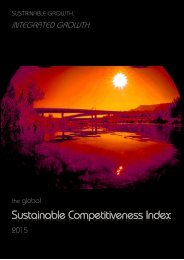Global Competetiveness Report
Create successful ePaper yourself
Turn your PDF publications into a flip-book with our unique Google optimized e-Paper software.
Country Rankings<br />
Social Cohesion<br />
Social Cohesion<br />
Country Rank Score<br />
Norway 1 78.3<br />
Iceland 2 76.1<br />
Denmark 3 75.5<br />
Finland 4 75.0<br />
Ireland 5 74.9<br />
Sweden 6 73.7<br />
Austria 7 73.0<br />
Germany 8 71.5<br />
Switzerland 9 71.1<br />
Japan 10 69.8<br />
Luxembourg 11 67.5<br />
Netherlands 12 66.1<br />
Slovenia 13 65.1<br />
Slovakia 14 64.9<br />
Belgium 15 64.9<br />
Canada 16 64.8<br />
Poland 17 64.4<br />
Cyprus 18 63.3<br />
Czech Republic 19 63.0<br />
France 20 62.1<br />
New Zealand 21 62.0<br />
Australia 22 60.8<br />
Spain 23 57.8<br />
United Kingdom 24 57.8<br />
Qatar 25 57.5<br />
Croatia 26 57.0<br />
Egypt 27 56.6<br />
Serbia 28 56.1<br />
Estonia 29 55.2<br />
Hungary 30 55.2<br />
Greece 31 55.0<br />
Malta 32 54.6<br />
Greenland 33 54.5<br />
Kosovo 34 53.7<br />
Tajikistan 35 53.5<br />
Italy 36 53.5<br />
Romania 37 53.3<br />
Montenegro 38 52.2<br />
Oman 39 52.0<br />
Singapore 40 52.0<br />
South Korea 41 51.6<br />
Armenia 42 51.4<br />
United Arab Emirates 43 50.2<br />
Bosnia and Herzegovina 44 49.7<br />
The Social Cohesion score is derived from a<br />
number of factors that measure individual<br />
aspects of social cohesion (health care,<br />
equality, crime, freedom, demographics).<br />
Social Cohesion is not an absolute necessary<br />
ingredient for short-term economic<br />
development, but facilitates economic<br />
growth. It is questionable, however, to what<br />
extend long-term economic development<br />
can be achieved without social cohesion. As<br />
sustainable development includes all levels of<br />
an economy, sustained sustainable<br />
development cannot be achieved without<br />
social cohesion.<br />
The individual data points were also analyzed<br />
against recent trends where sufficient data<br />
coverage is available. The score therefore<br />
reflects both a current momentary picture as<br />
well as the future potential and development<br />
trends.<br />
The calculated social cohesion scores show a<br />
certain correlation to GDP per capita level,<br />
raising the question whether social cohesion is<br />
the result or the cause of increased<br />
economic wealth. However, the correlation<br />
cannot be observed throughout all countries.<br />
The exceptions to the rule (correlation) such<br />
as the USA (high GDP per capita, but<br />
comparably low social cohesion score) seem<br />
to indicate that social cohesion is not a<br />
default outcome of economic success. It<br />
could also be an indication of the beginning<br />
decline of a society.<br />
Countries on the top of this list posses a strong<br />
consensus basis to achieve or sustain<br />
sustainable development, while countries<br />
with a low score face additional obstacles to<br />
achieve the same. High-income countries<br />
with a low social cohesion score are in<br />
danger of risking their economic<br />
achievements due to disintegrating social<br />
consensus.<br />
58<br />
The <strong>Global</strong> Sustainable Competitiveness Index








